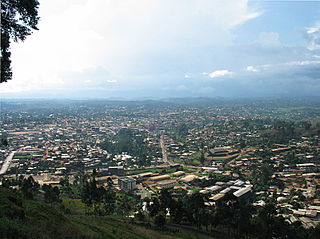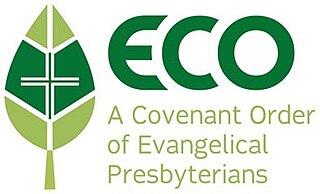
Presbyterianism is a part of the Reformed tradition within Protestantism that broke from the Roman Catholic Church. Presbyterian churches derive their name from the presbyterian form of church government by representative assemblies of elders. Many Reformed churches are organised this way, but the word Presbyterian, when capitalized, is often applied to churches that trace their roots to the Church of Scotland or to English Dissenter groups that formed during the English Civil War.

The Evangelical Presbyterian Church (EPC) is an American church body holding to presbyterian governance and Reformed theology. It is most distinctive for its approach to the way it balances certain liberties across congregations on "non-essential" doctrines, such as egalitarianism in marriage or the ordination of women, alongside an affirmation of core "essential" doctrinal standards.

Bamenda, also known as Abakwa and Mankon Town, is a city in northwestern Cameroon and capital of the Northwest Region. The city has a population of about 2 million people and is located 366 km (227 mi) north-west of the Cameroonian capital, Yaoundé. Bamenda is known for its cool climate and scenic hilly location.

The Ethiopian Evangelical Church Mekane Yesus is a Lutheran denomination in Ethiopia. It is the largest member church of the Lutheran World Federation. It is a Lutheran denomination with some Pentecostal influence and one Presbyterian-leaning synod, with a large Pietistic following.
Protestants in India are a minority and a sub-section of Christians in India and also to a certain extent the Christians in Pakistan before the Partition of India, that adhere to some or all of the doctrines of Protestantism. Protestants in India are a small minority in a predominantly Hindu majority country, but form majorities in the north-eastern states of Meghalaya, Mizoram& Nagaland and significant minorities in Konkan division, Bengal, Kerala& Tamil Nadu, with various communities in east coast and northern states. Protestants today trace their heritage back to the Protestant reformation of the 16th century. There are an estimated 20 million Protestants and 16 million Pentecostals in India.

The Roman Catholic Diocese of Kumbo is a Roman Catholic diocese in the Ecclesiastical Province of Bamenda in Cameroon. The first German settlers were Missionaries of the Sacred Heart who arrived in 1912 and established their mission in 1913. The Diocese of Kumbo was erected by Pope John Paul II on Thursday, 18 March 1982, with territory taken from the then Diocese of Bamenda. It is a suffragan diocese of the Metropolitan See of Bamenda along with the Roman Catholic Dioceses of Buea, Kumba, and Mamfe.
The Reformed Presbyterian Church of Equatorial Guinea is a minority church in Equatorial Guinea. It is reformed by its theology and presbyterian by its form of government, as stated in its constitution. The principal religion in Equatorial Guinea is Christianity, with approximately 85-93% of the population as followers. Most Christians belong to the Roman Catholic Church (80-87%) while a minority are Protestants (5-7%). Another 5% of the population follow indigenous beliefs, 2% are Muslims, followers of Baha'i and other beliefs.

The Presbyterian Church of Ghana is a mainline Protestant church denomination in Ghana. The oldest, continuously existing, established Christian Church in Ghana, it was started by the Basel missionaries on 18 December 1828. The missionaries had been trained in Germany and Switzerland and arrived on the Gold Coast to spread Christianity. The work of the mission became stronger when Moravian missionaries from the West Indies arrived in the country in 1843. In 1848, the Basel Mission Church set up a seminary, now named the Presbyterian College of Education, Akropong, for the training of church workers to help in the missionary work. The Ga and Twi languages were added as part of the doctrinal text used in the training of the seminarians. In the 19th and early 20th centuries, the Presbyterian church had its missions concentrated in the southeastern parts of the Gold Coast and the peri-urban Akan hinterland. By the mid-20th century, the church had expanded and founded churches among the Asante people who lived in the middle belt of Ghana as well as the northern territories by the 1940s. The Basel missionaries left the Gold Coast during the First World War in 1917. The work of the Presbyterian church was continued by missionaries from the Church of Scotland, the mother church of the worldwide orthodox or mainstream Presbyterian denomination. The official newspaper of the church is the Christian Messenger, established by the Basel Mission in 1883. The denomination's Presbyterian sister church is the Evangelical Presbyterian Church, Ghana.

ECO: A Covenant Order of Evangelical Presbyterians is an evangelical Presbyterian denomination in the United States. As a Presbyterian church, ECO adheres to Reformed theology and Presbyterian polity. It was established in 2012 by former congregations and members of the Presbyterian Church (USA), abbreviated PC(USA). Denominational disputes over theology—particularly ordination of practicing homosexuals as pastors and gay marriage—and bureaucracy led to the founding of ECO. In 2018, ECO has over 383 congregations, 103,425 covenant partners and over 500 pastors. ECO churches are egalitarian in beliefs and ordain women as pastors and elders.

The National Presbyterian Church in Mexico is the second-largest Protestant church, and the largest Reformed denomination in Mexico. It is present throughout the country, and is particularly strong in the states of Tabasco, Chiapas, Campeche, Yucatan, Nuevo León, Aguascalientes and Mexico City.
The Presbyterian Church in Sudan or also the Presbyterian Church in South Sudan is a major Reformed denomination in South Sudan, when it become independent from Sudan.
The National Evangelical Presbyterian Church of Guatemala was founded in 1882 by missionaries of the Presbyterian Church United States in Guatemala. The church took root in the urban middle-class people In 1950 the first Synod was organised and become independent in 1962. The church grew in membership rapidly among the indigenous people. The church has one Synod and 6 Spanish-speaking and 11 indigenous language presbyteries. Total membership is 60,000. Over the years the church was active in evangelism in the country of Honduras. The Evangelical Presbyterian Seminary was established in San Felipe. Today the majority of Synod composed by indigenous believers. The impact of Pentecostal movement has grown significantly in the recent years. The church affirms the Apostles Creed and Westminster Confession of Faith.
The Evangelical Reformed Church in Angola is a Reformed denomination in the country of Angola established by the missionaries of the Swiss Reformed church.
The Evangelical Presbyterian Church of Togo is a church of the Bremen Mission, which began its work in the Volta region in Ghana. The first congregation was established in 1893. The church was established at the end of the 19th century. At the time of World War I, the church had 22,000 members. After the departure of the German missionaries, the church sought to maintain its unity, and in 1922 the Evangelical Ewe Church was established, uniting the francophone and anglophone churches. The French-speaking church was established by the Paris Foreign Missions Society.
The Presbyterian Church in Rwanda has around 300,000 followers.
The Evangelical Church in New Caledonia and the Loyalty Islands was formed in 1958, the denomination has announced its 50th anniversary in 2008. The London Missionary Society started missions work in the 18th century. At the turn of the 19th century the London Missionary Society gave way to the Paris Evangelical Missionary Society. The church currently has 90 parishes and 100 house fellowships with 30,000 members. The church is a member of the World Communion of Reformed Churches and has relationships with the Maói Protestant Church, Presbyterian Church of Aotearoa New Zealand and the Presbyterian Church in Vanuatu.

The Eglise Evangelique Du Cameroun EEC (Evangelical Church of Cameroon) was born out of the European missionaries, the Paris Mission, Basel Mission and English Baptist Mission. After 1917 the Basel Mission handed over the majority of its mission stations to the Paris Mission. In 1957 the church become self-supporting and autonomous.
The Presbyterian Church in Korea (HapDongJeongShin) is a Reformed denomination in South Korea. It subscribes to the Apostles Creed and Westminster Confession. In 2004 the church had 112,275 members and 186 congregations.
The Evangelical Presbyterian Church of Sikkim (EPCS) is a Presbyterian denomination, established in Sikkim, in 1993, by churches that broke away from the Church of North India. As of 2014, it is the largest Christian denomination in Sikkim.










